In 2012, the Kichwa people of Sarayaku won a historic lawsuit against the Ecuadorian state in the Inter-American Court of Human Rights—one of the first major tests of Ecuador’s trailblazing 2008 Constitution, the first in the world to recognize the Rights of Nature. But thirteen years later, the promises of that legal victory remain largely unfulfilled. In early 2024, Ecuador’s Constitutional Court gave President Daniel Noboa six months to comply. He didn’t. And now, with his recent re-election and his efforts to roll back core environmental protections, it seems even less likely that he will.
Para leer este artículo en Español, ir a Ecuador, con los derechos de la naturaleza en el papel: el caso Sarayaku.
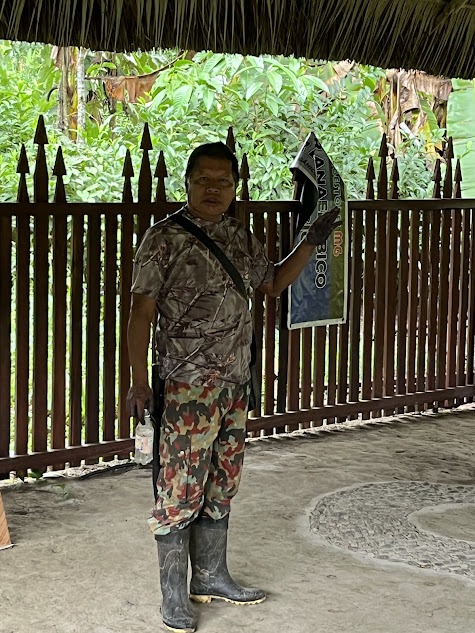
“We saw the problems coming,” says José Gualinga with a serious face, his features glowing in the light of the fire during a traditional guayusa ceremony in Sarayaku territory, in the heart of the Ecuadorian Amazon. Gualinga is one of the Sarayaku leaders who for more than three decades has led a historic movement of peaceful resistance against oil exploitation in the Amazon.
Today, the Sarayaku people stand not only as guardians of their territory, but as global trailblazers in the movement to recognize the Rights of Mother Earth — a struggle they helped bring into the international spotlight long before it became a legal trend.
Gualinga recounts the start of the struggle: “In 1990, when we heard the news that oil company CGC would enter the exploration phase, a group of young leaders, aware of the devastation petroleum had caused in the northern Amazon over the previous two decades, organized to stop them. That’s how the Peace and Life Encampments were born.”
He remembers how at the time, the oil company managed to buy the loyalty of many leaders of neighboring communities — sometimes with promises of development, sometimes with bribes and handouts, in classic Latin American political style. Soon, Sarayaku was left alone in its fight.
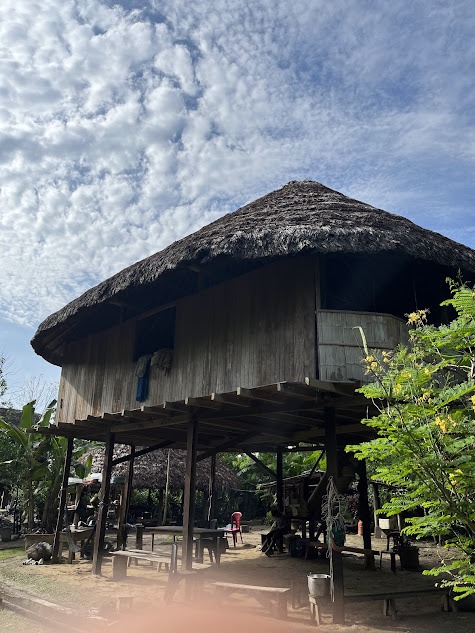
“They bought all the radio stations in Puyo and broadcast daily news and interviews demonizing our people. They said Sarayaku leaders were the obstacle keeping our people in poverty. Other leaders went on air to call on Indigenous communities to rise up against Sarayaku,” Gualinga recalls.
In 1999, after unsuccessful attempts to win over Sarayaku, the oil company announced it would enter by force. Sarayaku reinforced the Peace and Life Camps — surveillance posts to prevent the oil company’s entry.
Their strategy also included political advocacy in Quito and constant communication with international human rights organizations. The incursions into their territory lasted until 2003, when the Inter-American Commission on Human Rights issued emergency protective measures.They then took the case to the Inter-American Court of Human Rights, and it took nearly a decade after that for the Sarayaku to finally gain their favorable ruling.
As a result, Rafael Correa’s government paid Sarayaku $1.3 million in compensation and held a public apology ceremony.
The verdict also required the government to remove 1,400 kg (or a ton and a half) of explosives buried in virgin jungle — which has never been done. The explosives left in the sacred territory of Sarayaku continue to threaten what the people know as Kawsak Sacha – the living forest – and the lives and safety of the Sarayaku community, according to a press release they published in 2022. “Since the Inter-American judgment was issued in 2012, the State has not removed or deactivated even one kilogram of the more than 1,400 kg of explosives present in the territory. At the hearing it was evident that the State currently has no plan to comply with this order, nor to ensure Sarayaku’s participation and consultation on it.”
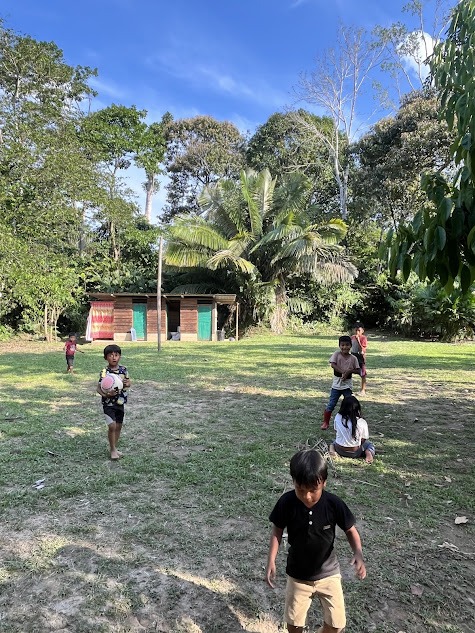
Nor has the government fulfilled the two most important points for Sarayaku: the guarantee of non-repetition, and the creation of a legal framework to ensure the right to Prior Consultation for Indigenous peoples affected by extractive projects.
In 2022, Sarayaku filed a complaint with Ecuador’s Constitutional Court for the state’s failure to comply with the ruling after ten years. In January 2024, the Court ruled in favor of Sarayaku, giving President Daniel Noboa six months to fulfill the ruling. Noboa has yet to even make a public statement on the case.
According to Mario Melo, the lawyer who represented Sarayaku, “Ecuador’s Constitution strongly supports the right to resistance, the collective rights of Indigenous peoples, and the rights of nature (…) What’s really lacking is political will on the part of the state to comply. Sometimes, organizations also hesitate to assert their rights. Sarayaku is an example.”
This legal struggle plays out in a country that once led the world with its 2008 Constitution—not only recognizing the Rights of Nature but also affirming Indigenous peoples’ right to Prior Consultation. Today, both promises are under increasing threat.
Prior Consultation?
This principle, written into the 2008 Constitution, requires the state to obtain the consent of communities affected by extractive projects before any intervention. Controversy began immediately after the new Constitution was passed.
Correa was the political force behind the world’s first Constitution to grant rights to nature and recognize Prior Consultation. But he had his own interpretation: when the government paid compensation to Sarayaku, Correa said that Ecuador is a democracy, not a state of consensus — meaning if a minority opposes a project that benefits the majority, the majority must prevail.
Since Correa left office in 2017, conditions for conservation and Indigenous rights have deteriorated. President Noboa has proposed a new Constitution that would eliminate the principle of Prior Consultation altogether.
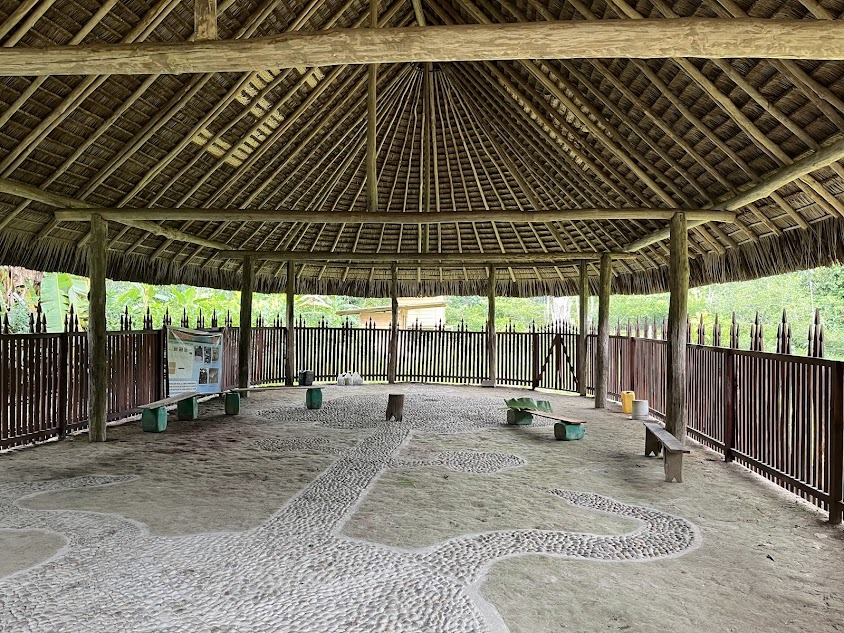
What Correa couldn’t have foreseen was that in the years to come, national referendums would be held on conservation issues — most recently, in the successful citizen initiative to ban oil drilling in Yasuni National Park — and in all of them, anti-extractivist votes would prevail. This created a window of hope for environmental protection.
Correa’s party remains the country’s most powerful political force, with a majority in the National Assembly. In the 2024 presidential elections, something happened that could change everything.
In the first round of voting, there was a near tie between Correa’s candidate Luisa González and current president Noboa. In third place came Leonidas Iza, representing Ecuador’s Indigenous peoples. With only 6% of the vote, Indigenous communities suddenly appeared to be the deciding factor in the April 2025 runoff.
For the first time, Indigenous peoples held real political leverage — the perfect circumstance for Ecuador to become the first country in the world to voluntarily turn away from extractivism. That would have been historic.
Like all Ecuadorians, both Indigenous Amazonian peoples and those in other regions want a more comfortable standard of living. But who says the only path to prosperity is through nature’s destruction?
And to those who still believe in the euphemism of “responsible extraction,” I quote Petrobras engineer Jorge Enrique Moreira, whom I interviewed in 2012. He explained in detail that petroleum extraction without disturbing nature is impossible. Other petroleum engineers I’ve spoken with say that “sustainable oil extraction” is basically a fairytale.
In the end, the alliance between Correa’s party and the Indigenous movement didn’t come to power. Despite leading in nearly every poll, and despite the serious political weakening suffered by Noboa’s presidency, Correa’s candidate lost by ten points. Rumors of electoral fraud have filled the political discourse ever since.
Face-to-Face Resistance
In 1999, under President Jamil Mahuad, the Ecuadorian government authorized the Argentine oil company CGC to enter Sarayaku territory — without any consultation process. Although Prior Consultation wasn’t yet constitutionally mandated, Ecuador had signed international treaties committing to it.
In 2002, the conflict escalated. The military openly supported the oil company, and Sarayaku turned to Ecuadorian courts. The company tried to negotiate, but Sarayaku’s demand was simple: leave. There was no middle ground.
The community went on high alert, seeking international help. Meanwhile, the company used dirty tactics: it destroyed a sacred tree, planted explosives in a sacred mountain, and tried to split the community by forming a parallel pro-oil leadership.
Listening to Gualinga and others describe the harassment by the oil company, it’s hard not to think of a real-life *Avatar nightmare.
“Our peaceful and persistent resistance worked,” says Gualinga. “But we won’t stop until the law is fulfilled and our territories are respected.”
Many see Sarayaku as an inspiration for other Amazonian communities to stand firm against extractivism. Their peaceful resistance — grounded in law — has indeed been successful. : no oil or mining operations have ever entered Sarayaku territory.
Yet across the country, many extractive concessions face active resistance. Sarayaku’s example reminds us that people have a right to live in a healthy environment — and that peaceful resistance works.
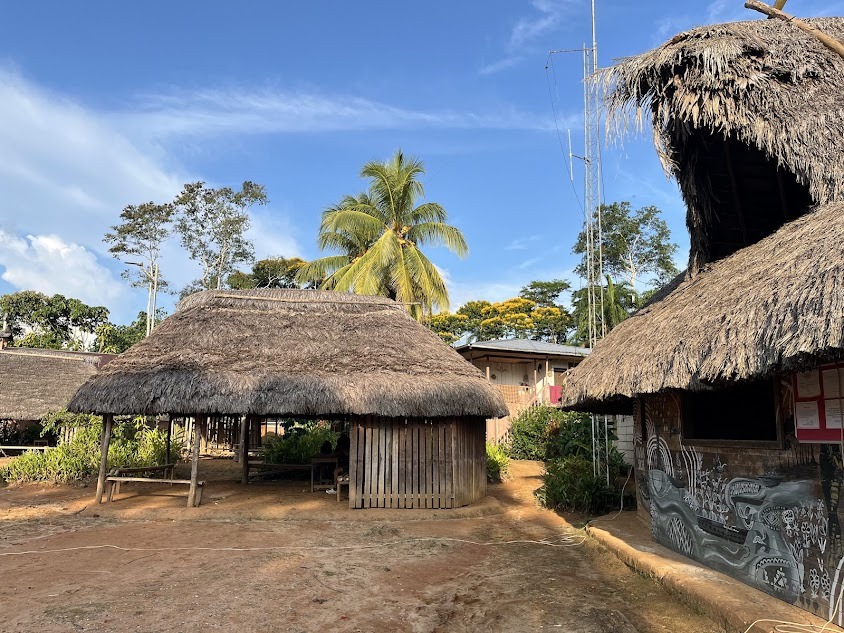
The Kawsak Sacha Proposal
What makes Sarayaku’s struggle unique is the context they give it. For community members, this isn’t just a land conflict. They are demanding the Ecuadorian state live up to the Constitution’s mandate to grant rights to nature and embrace Sumak Kawsay as a development model.
“Sumak Kawsay,” a Kichwa concept incorporated into the 2008 Constitution, means “Buen Vivir” or “Good Living.” Unlike the Western model of development, which measures well-being by access to goods and services, Sumak Kawsay takes a holistic approach. Its three pillars, according to Sarayaku’s Life Plan, are:
– Sumak Allpa (territory, environment, and natural resources)
– Runakuna Kawsay (economic, political, and social systems, including basic services)
– Sacha Runa Yachay (wisdom, ancestral knowledge, Indigenous education, and culture)
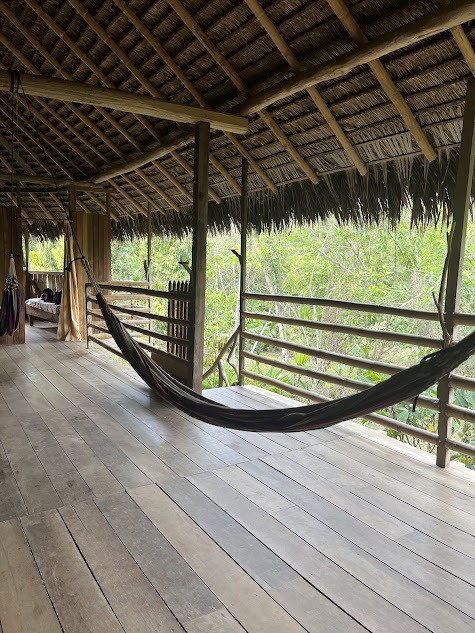
In 2018, Sarayaku presented the Kawsak Sacha (Living Forest) Declaration to the world — affirming that humans and nature are one living organism, and harming nature is simply wrong.
Gualinga explains: “The Kawsak Sacha Declaration is rooted in defending both the Rights of Nature, as guaranteed by the Constitution, and the collective rights of Sarayaku. It proposes ecological balance, values biodiversity, and supports Sumak Kawsay.”
He adds, “To truly recognize the Rights of Nature, we must recognize the beings of the forest as persons, not objects or resources. The beings of the forest relate to one another, and we Indigenous peoples coexist with them. Kawsak Sacha and Sumak Kawsay are inseparable — one cannot exist without the other.”
What Do Ecuadorians Say?
Caring for nature — for reasons beyond simply producing oxygen — is a core part of Ecuadorian culture. Not only among Indigenous peoples, who see nature as a mother to be respected, but also among urban dwellers, who are reconnecting with nature as part of a global trend.
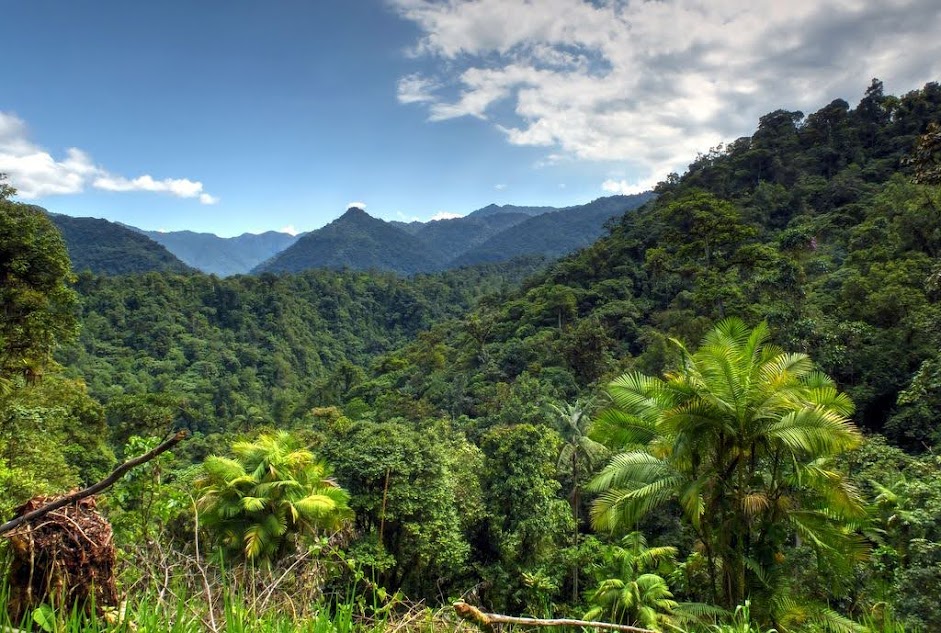
(Photo: Nambillo Biological Station)
In 2014 and 2019, referendums in Azuay Province rejected new mining projects. In 2023, a national referendum asked whether oil extraction should continue in Yasuní National Park. Despite a pro-oil media blitz, 59% voted to end operations there.
On the same day, voters in Quito’s Metropolitan District were asked whether the Chocó Andino forests should remain mining-free. An overwhelming 68% said yes.
Still, many politicians continue to see nature as a free source of wealth, regardless of constitutional or popular mandates.
One historic case is Chevron-Texaco. Between 1966 and 1972, Texaco caused massive contamination in Ecuador’s northern Amazon. In response, 47 Indigenous leaders filed suit in New York. Texaco got the case moved to Ecuador, where the Correa government supported a fair trial.
The Ecuadorian judge ruled for the plaintiffs: Chevron-Texaco was ordered to pay $9 billion in damages and issue a public apology. Instead, Chevron launched a smear campaign against Ecuador, the plaintiffs, and their lawyers.
In 2013, a U.S. federal judge ruled — incredibly — that the plaintiffs and their lawyers had committed extortion and applied RICO law (intended for organized crime) against them. In 2014, the same judge ruled the Ecuadorian trial was invalid and freed Chevron from its obligation.
This legal persecution continues today — especially against former attorney Steven Donziger, whose license was revoked, who served time in jail, and whose career was ruined for taking on the oil giant.
Recently, the Inter-American Court of Human Rights issued another landmark ruling — this time for the voluntarily isolated Tagaeri and Taromenane peoples living in Yasuní. The court found the Ecuadorian state guilty of violating their rights to life, dignity, environment, collective ownership, cultural identity, and more.
Solutions?
A group of Ecuadorian economists recently published “20 Economic Alternatives to Extractivism,” proposing modest tax reforms that would generate over three times the revenue produced by oil fields in Yasuní.
In addition, high-value bioenterprises — like those using Amazonian medicinal plants — are on the rise. Ecuador’s artisanal chocolate bars are now found around the world. A national brand associated with protected lands and ancestral stewardship would only grow in value.
Thematic tourism could also thrive. Ecuador as a country that enforces Rights of Nature would have a unique appeal for conscious travelers. Tourism can be harmful, or it can end poverty — it depends on the kind of people who come.
All signs suggest Ecuadorians prefer a slower, more respectful development model that honors both nature and Indigenous autonomy. The fact that Rights of Nature are in the Constitution is a major step — some call it hypocrisy, but I believe it means the laws will eventually have to be honored.
None of this is coincidence. The young leaders who kept extractivism out, the ongoing community struggles, the referendums, the court victories — they are part of a larger awakening. Humanity is realizing we are one with this beautiful blue planet, and that conservation is not a luxury, but a duty to future generations.
Politically, dark times lie ahead for conservation in Ecuador. Noboa’s government is determined to dismantle the world’s first Constitution to grant Rights of Nature. But the struggle continues. Significant and organized resistance continues within Ecuador against President Daniel Noboa’s efforts to dismantle the constitutional protections for the Rights of Nature. Indigenous communities, environmental organizations, and civil society groups are actively opposing these initiatives through legal action, public demonstrations, and international advocacy.
The Sarayaku, for their part, have done much more than resist — they’ve helped redefine the global conversation about environmental justice, anchoring a visionary struggle to recognize Mother Earth not as property, but as a living being with legal standing. And they are far from finished with this fight.
As for the Sarayaku case, Gualinga is resolute:
“We’ve been advised to file criminal charges against the government officials who failed to carry out the Constitutional Court’s ruling. We’re evaluating our options. But our position is clear and non-negotiable: Nature is not for sale.”
Riki Cevallos writes about environmental justice, food sovereignty, and humanity’s struggle for freedom. Follow his latest project, Filosofía Perenne 5.0, on TikTok and Instagram @FilosofiaRerenne5.0.
- Ecuador in Flames: Indigenous Movements Rise to the Rescue - October 14, 2025
- Ecuador: Rights of Nature on Paper — The Case of Sarayaku - May 26, 2025
- The Water Revolution in the Andes: Vilcabamba, Ecuador, on the front lines - December 20, 2024